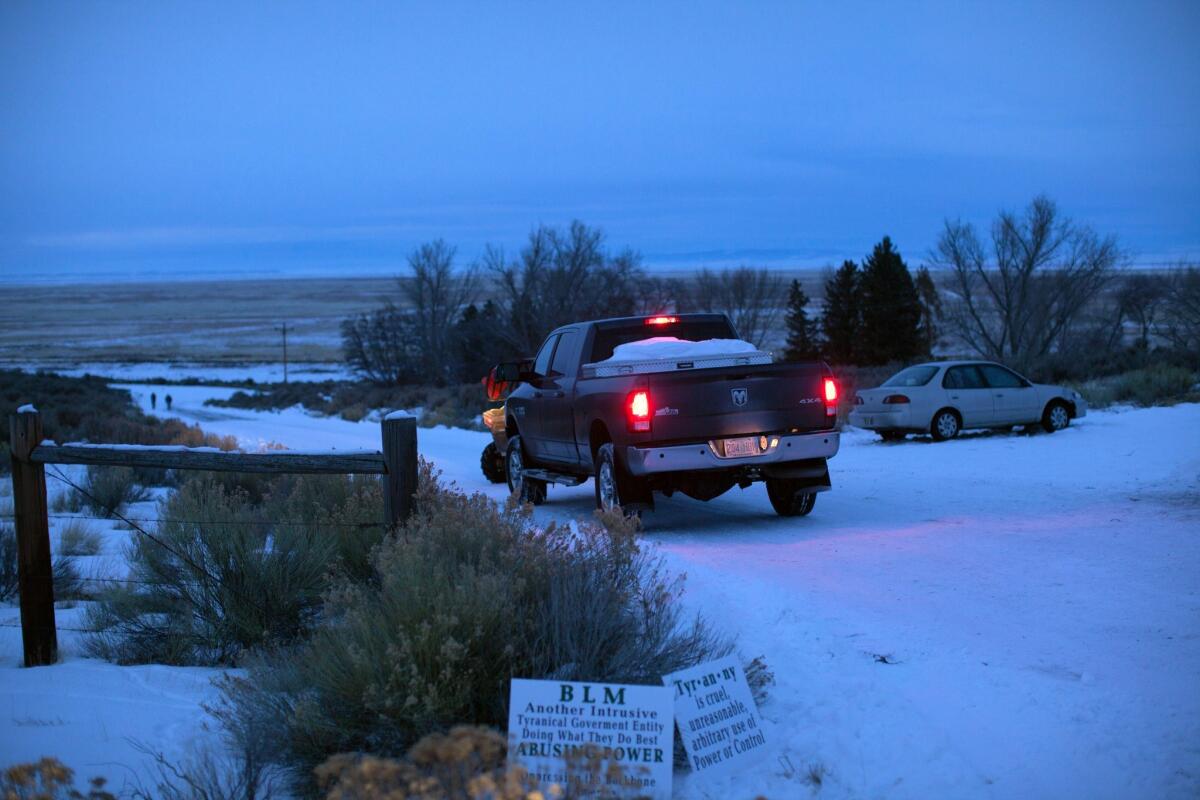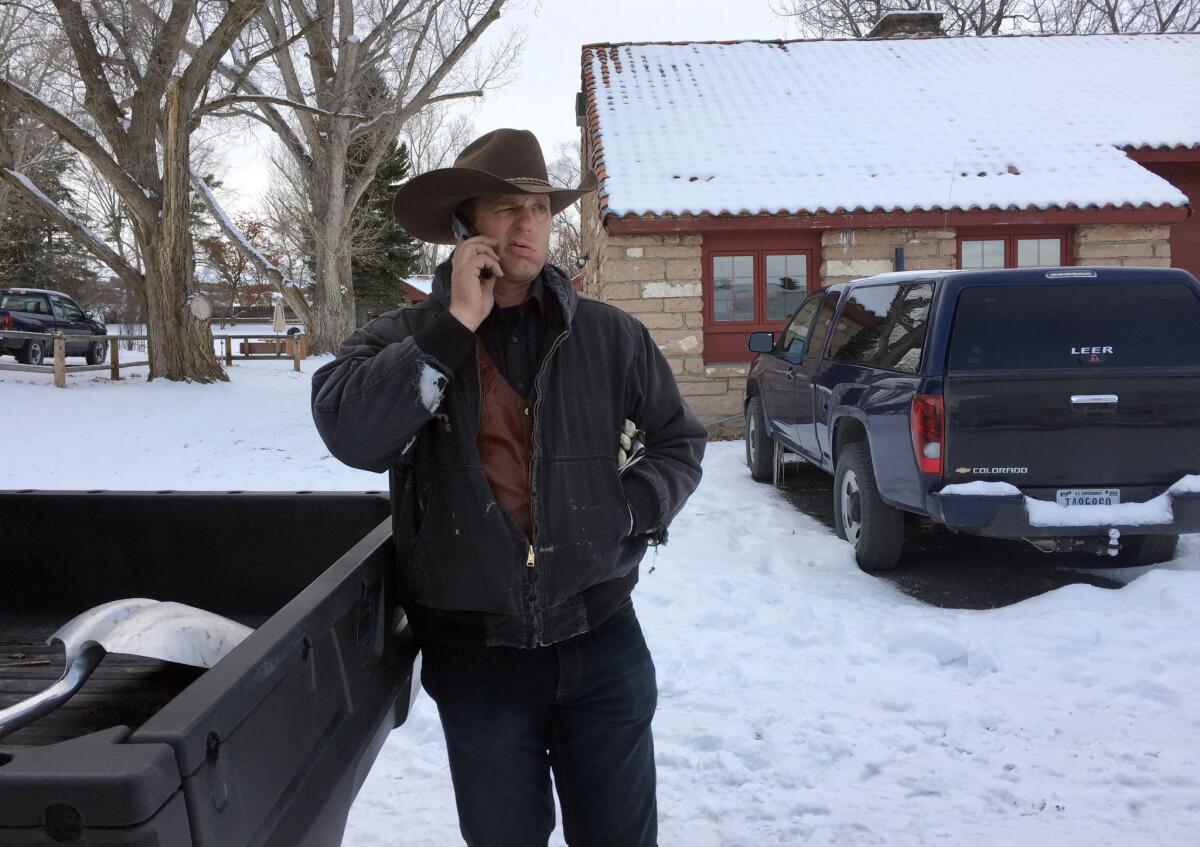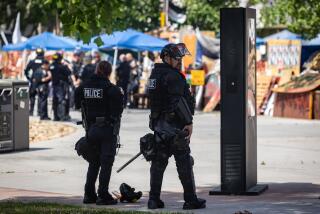Armed activists in Oregon challenge government over federal control of public land

Protesters march in support of an Oregon ranching family facing additional prison time for arson on federal land.
- Share via
Reporting from BURNS, ORE. — In this remote and rugged country of snowcapped foothills, a band of gunmen and self-proclaimed defenders of the U.S. Constitution have chosen to make their latest and boldest stand.
In another generation they were called Sagebrush Rebels, people of the West who bristled at federal control of much of this once-wild land and sought to reclaim it. The movement’s modern iteration has resisted labels; it has yet to make its demands clear.
But the long-running debate over federal control of public land that has fueled political conflict for generations has come to a new standoff in the rolling ranch lands of southeastern Oregon. The new activists began trickling into town in December, hanging on at the fringes, brandishing rifles and handguns, proselytizing from the beds of pickups against federal land ownership until, without warning, they struck.
On Saturday night, after a coordinated and peaceful protest of more than 100 people, a group of at least 15 men, some of them armed, broke off and occupied a federal wildlife refuge, blocked its entryway and declared themselves its rightful owners.
They remained there Sunday night, bundled against freezing temperatures and holding their position in one of the most direct provocations yet of the federal government, and one that has so far gone unchallenged.
State and federal authorities were preparing to establish a law enforcement command post Monday to coordinate a response to the standoff at the Malheur National Wildlife Refuge after activists at the refuge spent much of Sunday behind their makeshift barrier — a pickup and an American flag — eating donated chili, holding a news conference and surveying the refuge from an occupied observation tower.
Join the conversation on Facebook >>
“We will not fire unless fired upon, but we will stand and defend the Constitution,” Jon Ritzheimer, who traveled from Phoenix, said in a video posted from the refuge on Facebook.
When Nevada rancher Cliven Bundy led a weeks-long armed standoff against $1 million in federal grazing fees in 2014, federal and local agents were a constant presence. But Sunday’s occupation of an uninhabited building at the Oregon refuge, apparently led by his sons, showed no signs of law enforcement opposition.

The occupied Malheur National Wildlife Refuge.
Harney County Sheriff David M. Ward warned residents to avoid the refuge, about 30 minutes south of Burns, and warned that the group’s intent was nothing less than total overthrow of the government.
“These men came to Harney County claiming to be part of militia groups supporting local ranchers, when in reality these men had alternative motives, to attempt to overthrow the county and federal government in hopes to spark a movement across the United States,” Ward said in a statement Sunday.
Rhetoric from some of the protesters compared the standoff to encounters that led to the deaths of activists and federal agents.
Ritzheimer warned law enforcement officials against creating “another Ruby Ridge,” a reference to a deadly 1992 siege in northern Idaho between the FBI and backwoods cabin dweller Randy Weaver.
“Yes, there are some people that are armed,” Ritzheimer said. “We need to defend our rights. That’s what the 2nd Amendment is there for, people.”
Despite the absence of any law enforcement, Sen. Ron Wyden (D-Ore.) was briefed Sunday morning by the FBI special agent in charge of the Portland division and said the occupation was being monitored closely by state, federal and local authorities.
“The FBI is on this every minute,” Wyden said in an interview. “But based on comments from what we’ve heard in the community and what’s been reported, we may be in just the early stages of this.”
Wyden compared the frustrations of the activists to those of all rural Oregonians, who face a troubled economy yet to fully recover from the decline of the timber industry and dwindling federal dollars to replace lost timber income.
“There’s enormous frustration about the economy and a very powerful sense in rural communities that nobody listens to them, that they don’t have any power, that their voices don’t matter,” Wyden said. “But the next step isn’t to be led by some outsiders into doing something that doesn’t help anybody.”
The activists echoed that frustration.
“It’s about this community being trampled on,” one of the organizers of a rally that preceded the standoff, who did not identify himself, said as he stood on the bed of a pickup in the parking lot of a Safeway supermarket.
“This is the public saying we’re not going to take it anymore, we’ve had it.... The people of the republic are tired, and it starts right here in this parking lot, guys.”
Those leading what amounts to an armed occupation at the small, remote building say they are the vanguard of a national movement to resist the government’s ownership of vast stretches of land in the West.
The move began Saturday after the rally near Burns, where more than 150 people gathered in support of two locals who are facing additional jail time for arson — a sentence widely seen by their conservative supporters as a deeply unjust punishment and an example of federal bludgeoning.
Dwight Hammond, 73, and his son Steven Hammond, 46, said they set fires in 2001 and 2006 to reduce the growth of invasive plants and protect their property from wildfires.
The two were convicted of the arsons three years ago and served time — Dwight three months and Steven a year. But a judge ruled their terms were too short under federal law and ordered them back to prison for about four years each.
Hammond has said he and his son plan to report to prison Monday in San Pedro as ordered by a judge, but the court decision has generated controversy across the West.
After the protest Saturday, the small, armed breakaway faction proceeded to move on to the wildlife refuge, which was closed and empty.
“We can enforce the Constitution in Harney County and that’s what we intend to do,” Cliven Bundy’s son Ammon told reporters at a rally. “We have a lot of plans.”
Numerous Western conservatives have called for the return of federal lands to state and local government. The movement has waxed and waned since the so-called Sagebrush Rebellion of the 1980s, which centered on ranchers’ rights and the money that could be made from timber harvesting, mining and ranching if only the federal government didn’t forbid such profitable endeavors.
The movement has picked up steam in recent years, led by Utah legislator Ken Ivory, who helms a national organization called the American Lands Council that tries to persuade county and state governments to pursue the ownership of federal land. A watchdog group has accused him of fraud in three states for his use of taxpayer dollars to pursue his agenda.
The Southern Poverty Law Center said in a report on the earlier Bundy standoff that the militiamen and the federal land-return movement are part of the same spectrum.
“Anti-government extremists have long pushed, most fiercely during Democratic administrations, rabid conspiracy theories about a nefarious New World Order, a socialist, gun-grabbing federal government and the evils of federal law enforcement,” the center said.

Ryan Bundy talks on the phone at the Malheur National Wildlife Refuge near Burns, Ore. Bundy is one of the protesters occupying the refuge to object to a prison sentence for local ranchers for burning federal land.
The Malheur National Wildlife Refuge, incorporated in 1908 by President Theodore Roosevelt, has grown since its inception and presents challenges to the ranching families in the area, who say they are increasingly hemmed in by the federal preserve.
Beginning about one month ago, Ammon Bundy and others arrived in Burns and agitated locals, who wondered what they were up to. By Saturday, the plan became clear, and the Bundys, via their ranch’s Facebook page, called for “all freedom-loving people” to help occupy the wildlife refuge.
“The people are finally getting some good use out of a federal facility,” read a post by the Bundy Ranch on its Facebook page.
The protest quickly overwhelmed the small Harney County Sheriff’s Office, which asked the public to stop calling on Saturday because residents were having trouble reaching emergency dispatchers.
“A collective effort from multiple agencies is currently working on a solution,” Ward said in a statement. “For the time being, please stay away from that area.”
ALSO
Novelist Manuel Ramos makes sure Latinos are part of the story of Denver
Families are taken into custody as push to deport immigrants denied refuge begins
Next Chicago police chief faces daunting mission, and demanding boss in Rahm Emanuel
More to Read
Sign up for Essential California
The most important California stories and recommendations in your inbox every morning.
You may occasionally receive promotional content from the Los Angeles Times.











